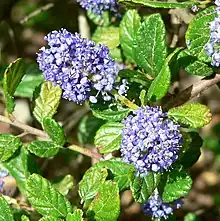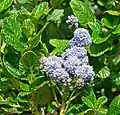Ceanothus griseus
Ceanothus griseus is a species of flowering shrub known by the common names Carmel ceanothus[4] and Carmel creeper. 'Carmel' refers to the Carmel-by-the-Sea region in California.
| Ceanothus griseus | |
|---|---|
 | |
| Ceanothus griseus inflorescences and leaves | |
| Scientific classification | |
| Kingdom: | Plantae |
| Clade: | Tracheophytes |
| Clade: | Angiosperms |
| Clade: | Eudicots |
| Clade: | Rosids |
| Order: | Rosales |
| Family: | Rhamnaceae |
| Genus: | Ceanothus |
| Species: | C. griseus |
| Binomial name | |
| Ceanothus griseus | |
| Varieties | |
| Synonyms[4] | |
|
C. thyrsiflorus var. griseus Trel. (basionym) | |
Description
The Ceanothus griseus shrub may exceed two meters-6 feet in height when mostly erect, or it can grow wider than tall. The evergreen leaves are ribbed and have slightly serrated edges and fuzzy undersides. The inflorescences are borne on thick stalks a few centimeters long and are dense with small blue or purple flowers. The fruit is a sticky black capsule about 4 millimeters in length containing usually 3 seeds. This is a plant of the chaparral and coastal scrub plant communities.
 Ceanothus griseus variation griseus
Ceanothus griseus variation griseus Ceanothus griseus variation horizontalis
Ceanothus griseus variation horizontalis
Distribution
This Ceanothus is endemic to California, where its distribution extends throughout the Coast Ranges in the northern two thirds of the state.
Cultivation
The species and cultivars are widely available in the horticulture trade for conventional and native plant habitat gardens.
References
- "NatureServe Explorer". NatureServe Explorer. NatureServe. 2022. Retrieved 19 May 2022.
- The name C. griseus was published in Ceanothus, 210, 212. 1942. Santa Barbara. "Plant Name Details for Ceanothus griseus". IPNI. Retrieved August 21, 2010.
- C. g. var. horizontalis was published in Ceanothus, 210, fig. 11a. 1942. Santa Barbara. "Plant Name Details for Ceanothus griseus var. horizontalis". IPNI. Retrieved August 21, 2010.
- The basionym C. thyrsiflorus var. griseus was first published and described in Synoptical Flora of North America 1(1[2]): 415-416. 1897. "Name - Ceanothus griseus (Trel.) McMinn". Tropicos. Saint Louis, Missouri: Missouri Botanical Garden. Retrieved August 21, 2010.
Basionym: Ceanothus thyrsiflorus var. griseus Trel.
